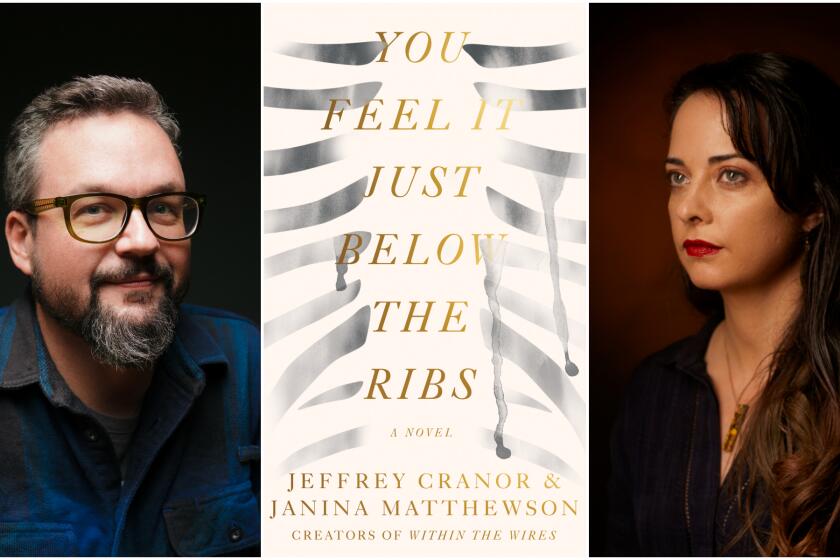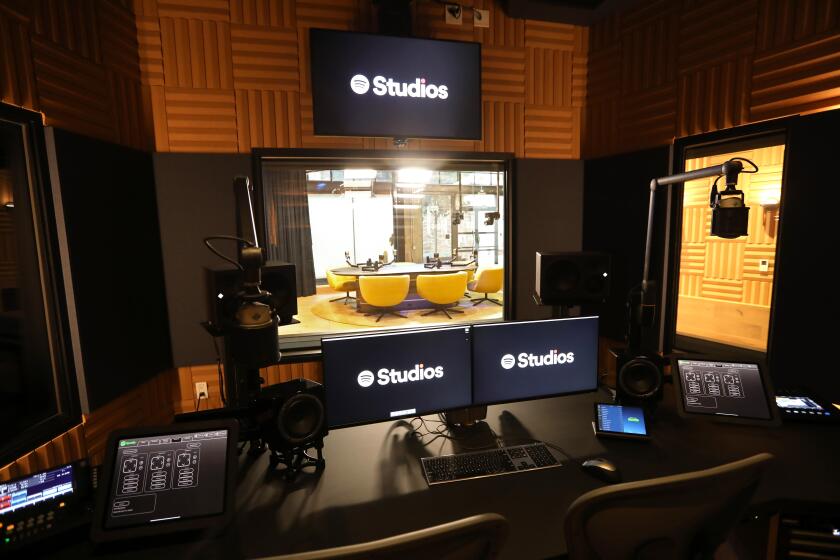How ‘Welcome to Night Vale’ went from an unlikely scripted podcast to a live show phenomenon
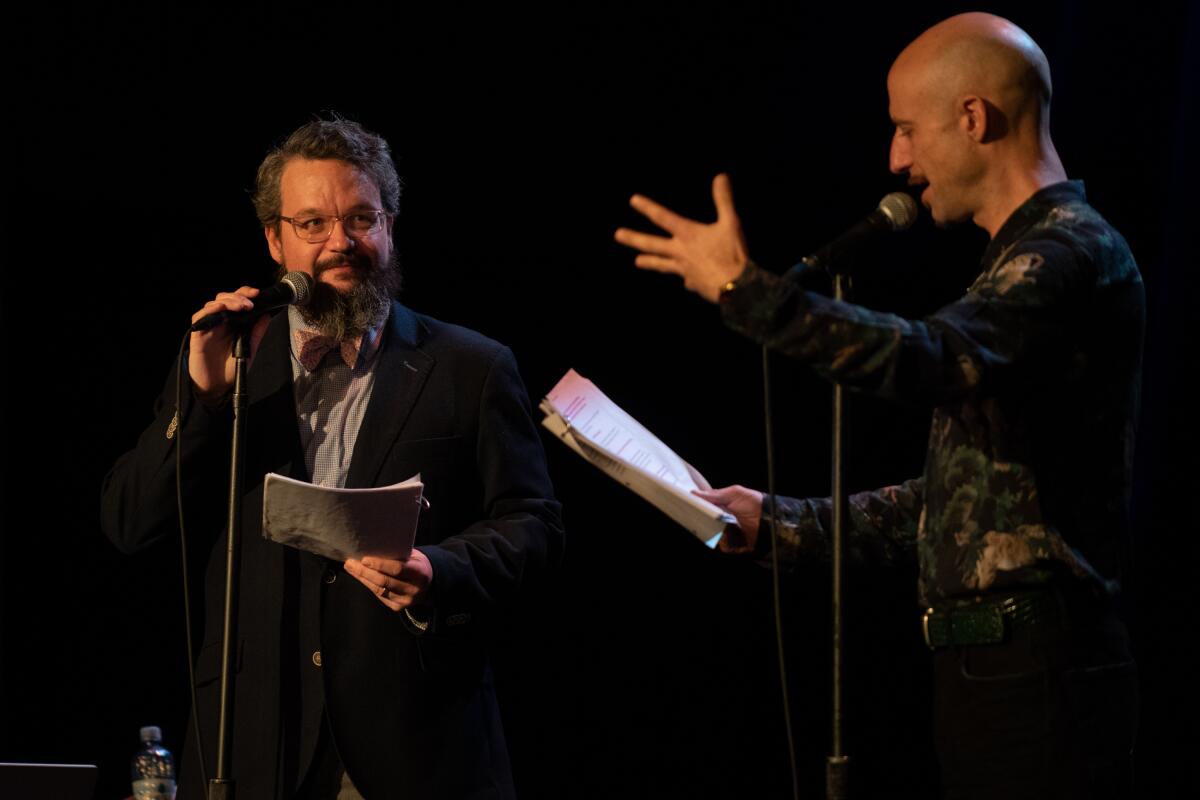
- Share via
When “Welcome to Night Vale” premiered in 2012, Jeffrey Cranor and Joseph Fink had no idea what it would become. Milling around the off-off-Broadway world in New York City, the creators and co-writers were simply doing what they’d always done: moving from project to project and hoping that maybe a few friends would watch or listen.
Ten years later, the “Night Vale” podcast has exploded into a massively popular storytelling vehicle chronicling a fictional, dystopian, desert town “where every conspiracy theory is true.” Boasting millions of downloads per month, it has spawned an entire universe of books, live shows (including its ongoing 2022 world tour) and even more podcasts under the “Night Vale Presents” umbrella.
Narrated by voice actor Cecil Baldwin, “Night Vale” is a sort of Masterpiece Theater for those drawn to the strange and unusual: think “A Prairie Home Companion” meets “Stranger Things” meets “Twin Peaks.” Not unlike the “News From Lake Wobegon,” “Night Vale” adopts a community radio-type format, chronicling a vaguely Southwestern American town “difficult to leave, and difficult to enter,” where residents live in tandem with various supernatural creatures and events. Celebrities have flocked to visit Night Vale — Retta, Mara Wilson, Will Wheaton and Marc Evan Jackson have voiced characters such as Old Woman Josie and the Faceless Old Woman Who Secretly Lives in Your Home.
In honor of the podcast’s 10th anniversary, The Times sat down with Fink, Cranor, Baldwin and a few more cast members to reflect on a decade in Night Vale and what fans can expect to hear on “Unlicensed.”
When “Welcome to Night Vale” began, did you have any inkling what the show might become? What did you originally set out to do?
Joseph Fink: We were all involved in the New York off-off-Broadway scene. When you’re in that world, you’re constantly doing projects. Then you make a thing and 20 people see it, and you go and do the next thing. Jeffrey and I had just written and performed a show together called “What the Time Traveler Will Tell Us.” I was like, “Let’s work on another thing.” So when we started, that was the plan. Let’s make a thing and maybe a couple hundred people might hear it.
Jeffrey Cranor: Once we started doing it, we set up a Facebook page and a Twitter account to pump it up a little bit more. When we put the first episode up, we were hosting it on my personal website. I think we had 54 downloads. We were hoping to slowly grow it over time. We didn’t really have any big plans, like, “Someday we’ll be touring the United States and Europe, and we’ll have some books published and try to pitch a TV show based off this.”
Cecil Baldwin (Cecil Gershwin Palmer): The expectations were none. We met at a coffee shop in New York City and Joseph had a $25 microphone wrapped in a T-shirt that he loaned to me to make the first few episodes. There was no planning — it really was an experiment in “there’s a lack of fictional episodic podcasts that don’t sound like ye olde golden age radio” that was more modern storytelling, like a play that just happened to be set in an audio booth. The two writers capitalized on that and said, “Well, what if we combine neo-futurism, podcasting, ‘The X-Files,’ Will Eno and Neil Gaiman, and see what happens?”
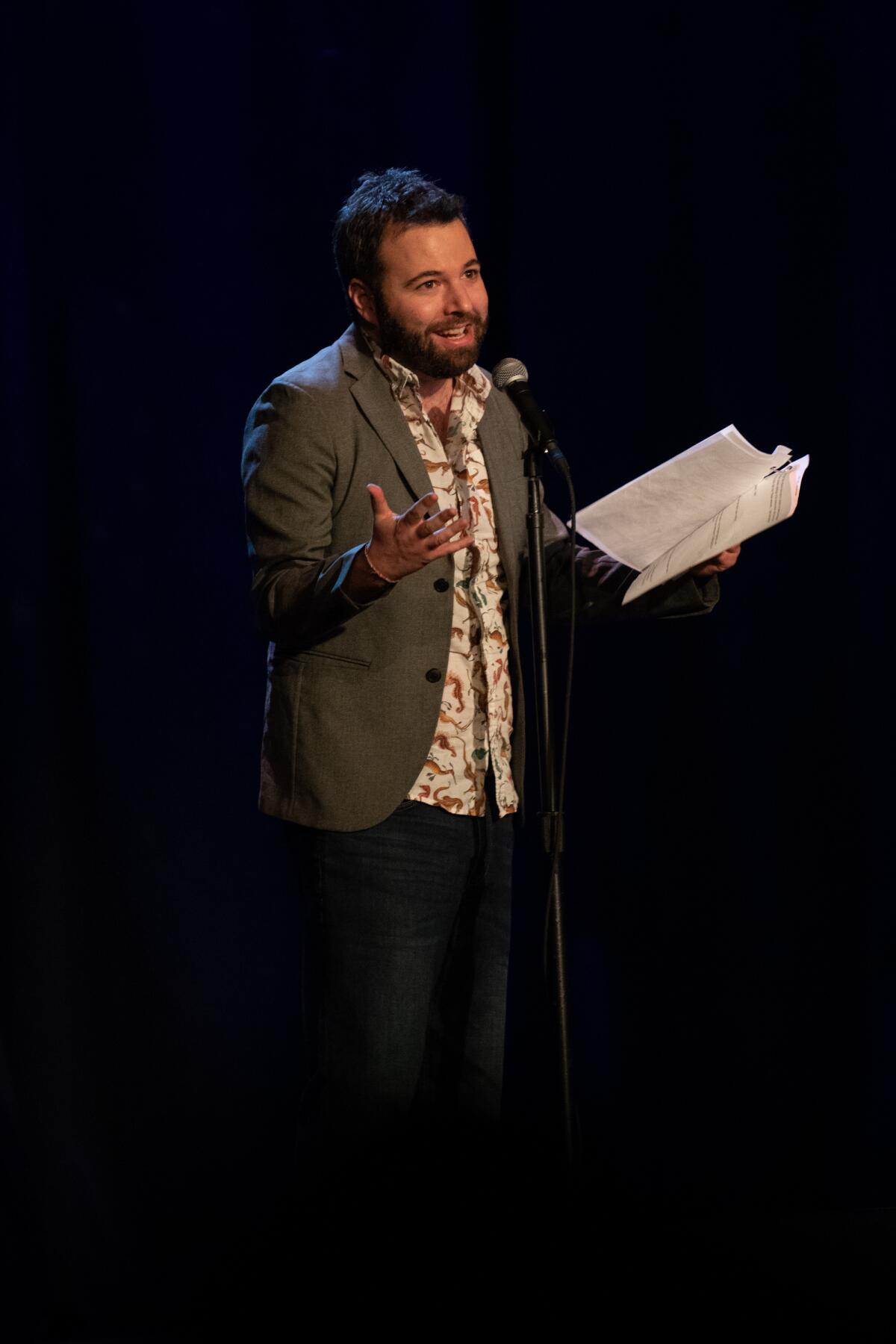
The podcasting industry has obviously boomed in the decade since “Night Vale” began. How has the show responded to or capitalized on the popularity of podcasting as a medium?
Baldwin: It’s very scripted. It’s very much about the language. I’m a classically trained actor; I did Shakespeare and Molière for many years. I have this love of poetry that I apply to the writing that Joseph and Jeffrey send to me every week. I think that was something very fresh, added to the fact that I record from home, I am my own director. I read this main character as being queer because I myself am a gay man. And it just got wrapped up into the official story of Night Vale. That clued in a lot of LGBT+ listeners to this podcast as a place where Night Vale is a terrifying city to live in, but there’s still a normality there that treats every person as being completely equal.
Fink: When we started “Night Vale,” we really thought we were coming late to podcasting. There were already so many shows. We were drawn to podcasting precisely because we were listening to a lot of them. Of course, now it feels like we came before almost all the podcasts people talk about because things changed quickly after “Serial” — there was a real dividing line. We were doing major live tours before “Serial,” but at the time, we would have to explain to the entire theater staff what a podcast was, because they genuinely had no idea what we were doing there. That never happened again after 2014.
What has surprised you about the fan response over the years, particularly in terms of how listeners take their fandom to social media and cosplay?
Fink: Our initial blowup in popularity was 100% Tumblr. There was this huge word-of-mouth explosion. I didn’t even know what Tumblr was. I vaguely had heard the name, but I’d never looked at the website. I didn’t know what it did or what people did on it. I think if you write something with an audience in mind, people can smell that. We had written this thing entirely for ourselves. It found this audience that we never expected, but that is wonderful. Whenever we do a live show, the staff is often like, “Your fans are the nicest fans.” And they really are.
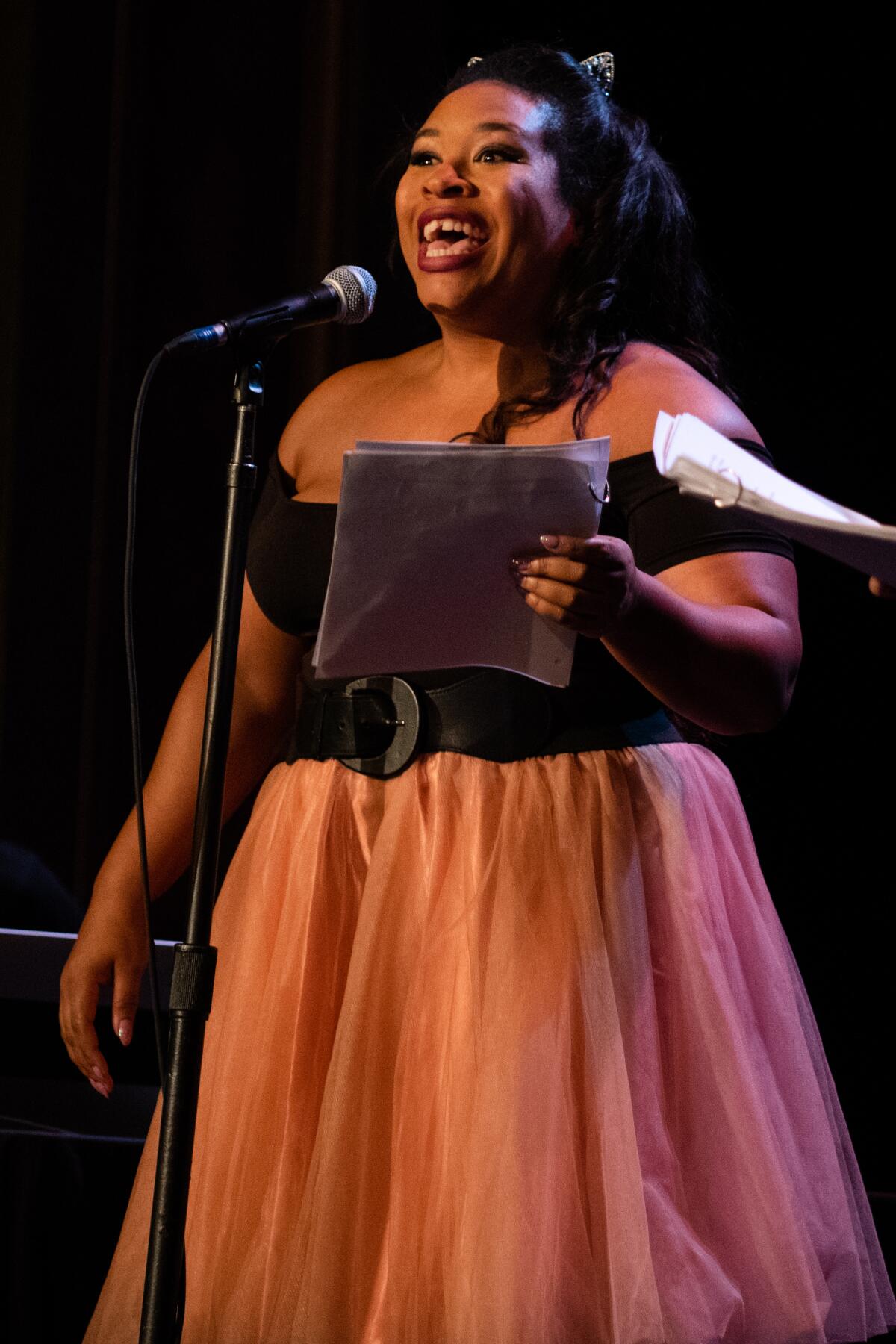
Symphony Sanders (Tamika Flynn): The cosplay is always so impressive to me. It’s always exciting to see a Glow Cloud or a Hooded Figure or a Huntokar. I think our audience has grown up with us as well. When I started, the bulk of our audience was much younger. Now it’s been almost 10 years. People who are still in the fandom have grown up, some of them have families of their own. I don’t feel like I’ve gotten any older, but then I see people who are like, “I’ve been listening to this since high school.” And I’m like, “And that was …?” [Laughs.]
“Night Vale” has always been inherently interested in conspiracy theories. As conspiracy theories have taken over mainstream conversation these last few years, has that affected the “Night Vale” universe?
Fink: I guess it would have to, right? A lot of it is not conscious, but so many of the ideas come out of what [we’re] thinking and feeling that week. There’s definitely been times where we’re like, “Oh, God, our parody has literally become true.” We have a character named Pamela Winchell who does ridiculous press conferences. There was one where she ended the press conference by hiding in the bush. And then, of course, Sean Spicer hid in a bush to get away from White House press.
Baldwin: In my role as performer, I find it much more interesting to treat heavy things lightly and to treat light things heavily. Oftentimes people talking about [conspiracies] are extremely serious and very self-important. I find that a little bit trite. We all watched “The X Files” in the ‘90s. We loved it. But it’s already been done. So how can I as an artist interpret that? And it is to treat those deep, dark conspiracy theories as just another Tuesday.
You have a new show coming out in November, “Unlicensed,” that is supposed to be set in Los Angeles. What can you tell us about the new show, without giving too much away?
Fink: “Unlicensed” is an L.A. detective story. We wanted to write a modern-day detective story, but one that doesn’t take place in any of the cool parts of L.A. It takes place in Azusa and Oxnard and Vernon — just places that aren’t in a lot of those classic L.A. stories but that are real places where real people live.
It’s about an unlicensed private detective named Lou and her new assistant Molly. They get a new case where a teenage girl comes to them and says, “My younger brother ran away and came home. But the boy that came home is not the boy that left. That’s not my brother.” And, in classic L.A. noir style, this very small, strange case sprawls out into this huge statewide conspiracy involving cults and backroom deals. I’m very proud of it. We spent a lot of time looking at California mystery writing and thinking about what works about it. Also, this was the first show we brought in a writers room of people who we’ve worked with before and helped develop the story together with them.
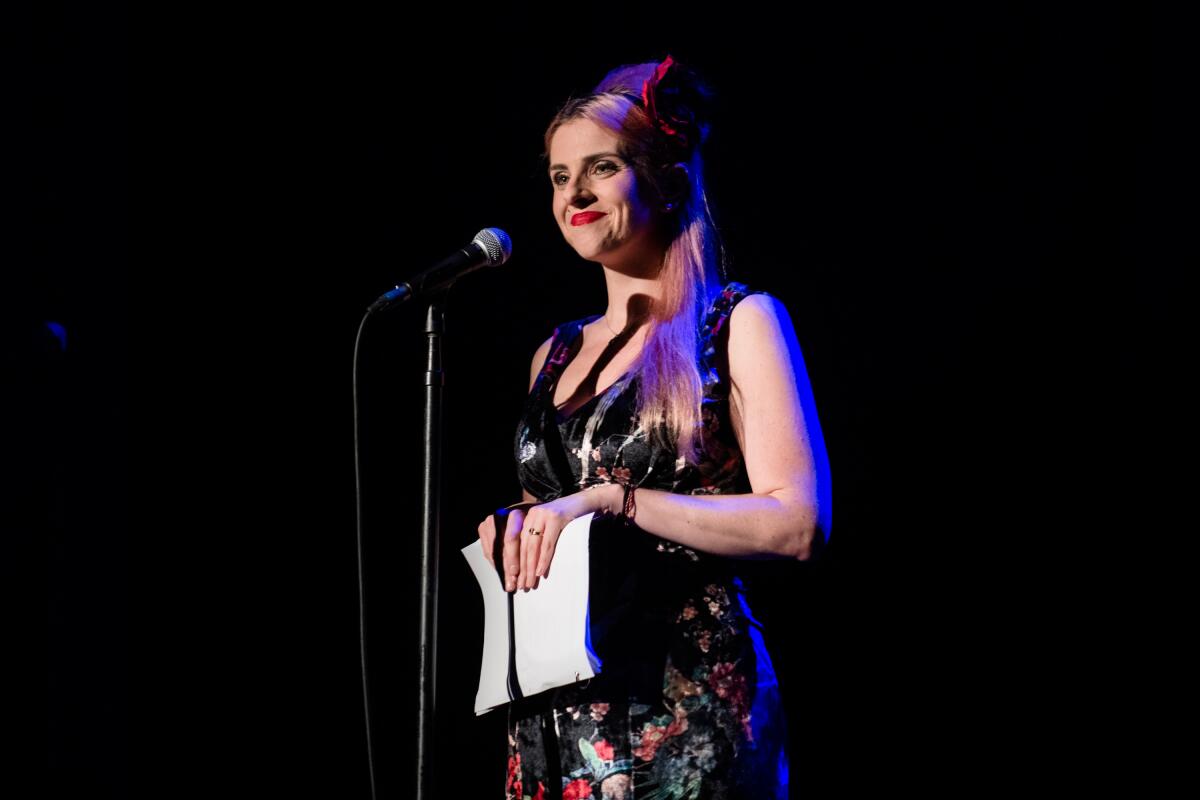
How have the live shows evolved? What do you bring to a live “Night Vale” recording that you wouldn’t get by simply listening to the pod?
Cranor: We decided early on that if we’re doing a live show, we want the fans to like it. But we don’t want it to be stuff they’ve already heard. So we would write brand-new material. It also needed to be something that you could bring your girlfriend or your roommate or your mom, or whoever, to the show, and if they’ve never even heard the podcast, to try and make a show that’s immediately accessible for them too.
Meg Bashwiner (Deb the Sentient Patch of Haze): There’s this thinking in the world of theater today that it’s unaffordable, it’s for old blue hairs. That’s not who’s in the “Night Vale” theater. It’s a young audience, a queer audience, a dynamically different age audience: there’s young and old, parents and kids. It’s multigenerational. It’s for the most part been affordable — we try to keep our tickets under 45 bucks. It’s a way for people who listen to something alone to come together. There’s a lot of community bonding.
Fink: After almost 10 years of live shows, a lot of me feels like the heart of “Night Vale” is in the live shows, almost more than the podcast. It’s this family of people that have been writing and performing together all over the world and have really developed this dynamic. I’m very, very proud of what we’ve done.
More to Read
The biggest entertainment stories
Get our big stories about Hollywood, film, television, music, arts, culture and more right in your inbox as soon as they publish.
You may occasionally receive promotional content from the Los Angeles Times.
